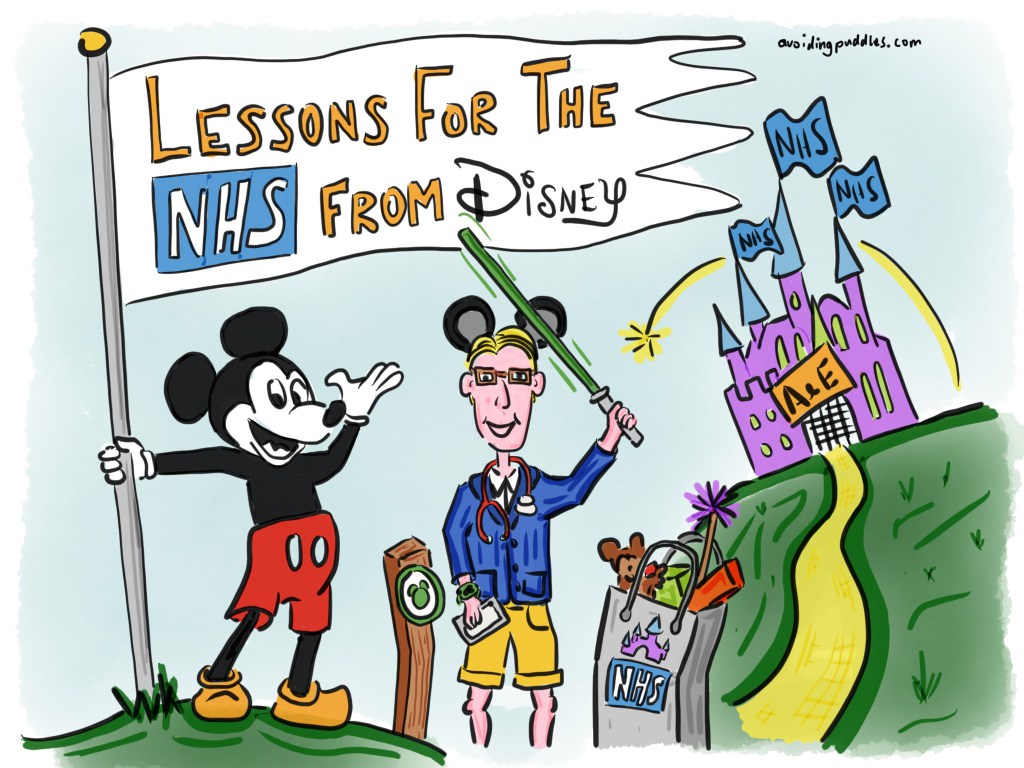What can the NHS learn from Disney?

Working as a GP in the NHS can be tough at times and I felt this a little more than usual last week having just returned from the artificial bubble of Disney World, the ‘happiest place on earth’.
Disney has a reputation for crafting wonderful experiences and for fantastic customer service. They have a great track record for innovation and, of relevance to the NHS, they have successfully reinvented themselves through different eras of entertainment and change. Of course, it has faced its fair share of criticisms too.
To fix the NHS will obviously require much more than a little Disney magic. But here are my four thoughts on what the NHS might learn from the imagineers at Disney:

Source: Dr Andrew Foster
1. Use technology and transparency to manage the behaviour of people
Disney Parks have a great mobile app. One of the features is designed to allow customers to see the waiting times at all rides and attractions and reserve queue jumping tickets, allowing them to prioritise some attractions and avoid others with longer waits. The result is that people moderate their behaviour in response to the information, allowing more people to have a great day without increasing the capacity of the rides.
What can the NHS do?
- Develop an app or website to help patients better navigate NHS services.
- Allow patients to see what the waiting time in A&E is before they decide to go. Perhaps they will decide not to.
- Let patients see their ‘reservations’ or appointments at hospital and primary care clinics in one place.
- Allow patients to see how busy their GP surgery is. If boundary rules were relaxed and records more universally available then patients who choose to could use alternative GP practices which are less busy at the time they are looking.
- Allow patients a limited number of ‘fast passes’ for quicker access each year to use when it is really important to them, more for those with a higher disease burden.
2. Focus on great customer service
At Disney, all staff from the street sweepers up, are called ‘cast members’. They invest heavily in customer service training with all staff attending orientation training courses covering Disney’s culture, heritage, values and traditions. Obviously, it is difficult to deliver high quality customer service consistently, particularly in emotionally-charged, high stress environments like the NHS – but not necessarily impossible.
What can the NHS do?
- The NHS has a rich history stretching back to its post war founding in 1948 with its compelling mission – ‘Healthcare for all, free at point of delivery and based on clinical need, not ability to pay’. Is there a role for a high quality NHS staff induction and training programme focussed on our heritage and values?
- At my surgery we are developing a staff induction session emphasising the mission and culture of our practice and the value of general practice and the NHS. We have included the excellent The Good GP video from the Royal Australian College of GPs.
3. Use the value in the brand
Disney has used their brand to enter new markets in order to deliver their mission of spreading happiness (and making more money of course). They also enter into partnerships with other organisations where this adds value, such as its partnership with Premier Cruise Line that led to the development of their own Disney Cruise Line.
What could the NHS do?
- The NHS is globally recognised, has a fantastic mission and a trusted brand. But is the ‘NHS brand’ underdeveloped and underused?
- Could the NHS make better use of its brand assets? Perhaps it could partner with weight loss programmes, food manufacturers, gyms or health products/apps? Or it could partner with the BBC to enter the business of children’s entertainment with responsible health education?
- Does the NHS have intellectual properties or investments that could be developed to deliver profit overseas in a similar way to BBC Worldwide?
4. Make use of time spent waiting
While waiting for a ride or restaurant at Disney World, there is generally something to do – a game to play, a display to look at, preparation or briefings for the ride to come.
What could the NHS do?
- Could we help patients break up the frustration of waiting in clinics? Why not engage them with meaningful activities, for example, playing a health education game or watching a health promotion video relevant to their visit?
- Patients could answer initial questions to prepare them and the doctor/nurse to get the most of their time face to face. Is there an opportunity for a well-designed app or website to fill this gap?
Dr Andrew Foster is a GP in Nottingham. This piece was originally posted on his blog www.avoidingpuddles.com. You can follow him on Twitter @drawfoster









